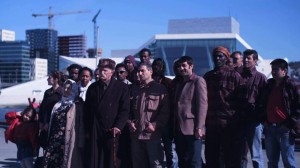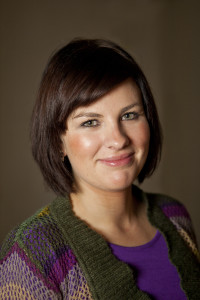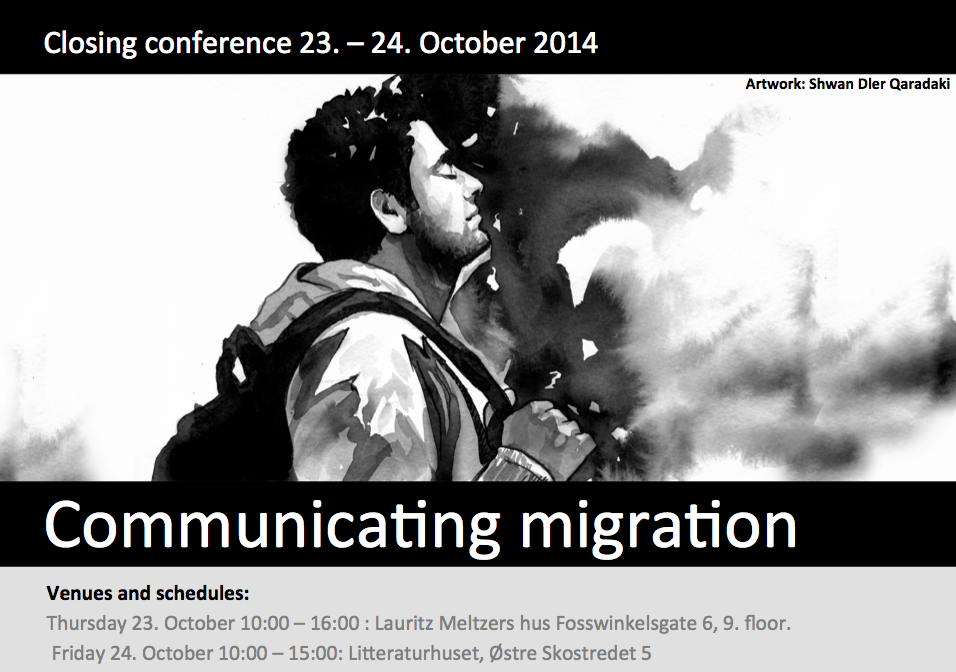Dear all, here is the IMER Bergen newsletter for January and February 2015. If you want to include something in the next IMER newsletter, please send an e-mail to imer@uni.no (text should be between 50 and 150 words + title and web links)
Author Archives: halvarak
First IMER Lunch Spring 2015
Randi Gressgård: Plural policing and the safety–security nexus in urban governance.
Tuesday 17.2. 2014 @ UNI Rokkan centre Nygårdsgaten 5, Bergen (6 etg)
 Based on a study of policy frames in urban politics in Sweden, Malmö in particular, this article discusses the safety–security nexus in urban governance. It argues that perceived safety figures as an index of order and integration, and security becomes part and parcel of an expanded cohesion agenda which chain-links criminal justice, immigration control and civic integration. The expanded cohesion agenda in urban governance involves plural urban policing enabled by partnership agreements between the police and local authorities.
Based on a study of policy frames in urban politics in Sweden, Malmö in particular, this article discusses the safety–security nexus in urban governance. It argues that perceived safety figures as an index of order and integration, and security becomes part and parcel of an expanded cohesion agenda which chain-links criminal justice, immigration control and civic integration. The expanded cohesion agenda in urban governance involves plural urban policing enabled by partnership agreements between the police and local authorities.
IMER Seminar: Maja Janmyr – “Returnmania”, A seminar on Norway´s readmission agreements
IMER seminar in collaboration with Centre on law and social transformation (Note time: 12.15- 14.00 Tuestday 25th of November – UNI Rokkansenteret)
 For Norway, deporting irregular migrants is currently among the highest political priorities, and never before have so many deportations taken place – with 7100 forced returns an all-time high is expected to be reached in 2014. In this presentation, Janmyr will discuss one of the oldest instruments used by states to control migratory flows – readmission agreements. Such agreements typically assist in overcoming bilateral difficulties by setting out reciprocal obligations on the contracting parties to facilitate the return of persons who do not fulfil the Continue reading
For Norway, deporting irregular migrants is currently among the highest political priorities, and never before have so many deportations taken place – with 7100 forced returns an all-time high is expected to be reached in 2014. In this presentation, Janmyr will discuss one of the oldest instruments used by states to control migratory flows – readmission agreements. Such agreements typically assist in overcoming bilateral difficulties by setting out reciprocal obligations on the contracting parties to facilitate the return of persons who do not fulfil the Continue reading
Open events PROVIR conference: Film, panel discussion and presentation of research findings
Film and panel discussion on the dilemmas of mediating irregular migration
Wednesday 19th of November @ Tegleverket, Det Akademiske Kvarter, Bergen.
 18-00 to 19.30 Letter to the King portrays five people on a day trip from a refugee camp to Oslo, a welcome change in an otherwise monotonous life. But we soon realize that each and every one of them has an agenda for their trip. All five will make decisive choices on this day, as they discover happiness, humiliation, love or fulfill a long-awaited revenge. The five stories are tied together by a letter, written by eighty-three year old Mirza. Mirza wants to hand over the letter to the King personally. (Film by Hisham Zaman) Continue reading
18-00 to 19.30 Letter to the King portrays five people on a day trip from a refugee camp to Oslo, a welcome change in an otherwise monotonous life. But we soon realize that each and every one of them has an agenda for their trip. All five will make decisive choices on this day, as they discover happiness, humiliation, love or fulfill a long-awaited revenge. The five stories are tied together by a letter, written by eighty-three year old Mirza. Mirza wants to hand over the letter to the King personally. (Film by Hisham Zaman) Continue reading
Communicating migration closing conference
The conference is open: No registration
The IMER seminar series for 2014 have covered how migration and ethnic relations are communicated in every-day encounters, in mass and social media, in art, in politics and in research and teaching at the universities. Has the way people talk about migration and migrants in different social contexts changed over time, and in which ways has it changed?
How does migration theory and research relate to other topics and theories in the social sciences, and how do results from migration research inform public debate and policy development? What are the challenges we encounter in communicating migration? Continue reading
IMER SEMINAR: Katrine Mellingen Bjerke: Elderly migrants in Norway
October 14th 2014, 2:15 – 4:00 pm UNI Rokkan centre, Nygårdsgaten 5, Bergen (6. etg.)
 Aging of the population raises a series of different challenges for the Norwegian elderly care system. One of the challenges is related to user differentiation, that is, the understanding that services should be adapted to each user’s individual needs. Related to this emphasis on user differentiation is an increasing cultural diversity amongst the elderly population as cohorts of labour migrants and refugees that came in the 1960s and 1970s are facing old age. This necessitates more knowledge about how these elderly migrants perceive of old age, and particularly how they experience and perceive Norwegian care services. This paper addresses how elderly immigrants with a Pakistani and Polish background perceive of aging in Norway, and how they experience and relate to the Norwegian welfare and care regime. What are their expectations? How do they go about covering their assistance needs, both formally (within the public welfare system) and informally (within their family and/or the community).
Aging of the population raises a series of different challenges for the Norwegian elderly care system. One of the challenges is related to user differentiation, that is, the understanding that services should be adapted to each user’s individual needs. Related to this emphasis on user differentiation is an increasing cultural diversity amongst the elderly population as cohorts of labour migrants and refugees that came in the 1960s and 1970s are facing old age. This necessitates more knowledge about how these elderly migrants perceive of old age, and particularly how they experience and perceive Norwegian care services. This paper addresses how elderly immigrants with a Pakistani and Polish background perceive of aging in Norway, and how they experience and relate to the Norwegian welfare and care regime. What are their expectations? How do they go about covering their assistance needs, both formally (within the public welfare system) and informally (within their family and/or the community).
Katrine Mellingen Bjerke is a PhD candidate at the Department of Sociology, at the University of Bergen. She is also associated with IMER Bergen. Her PhD project explores how elderly migrants perceive of the public elderly care services in Norway.
IMER SEMINAR: Rolf Halse: Muslim characters in the television serial 24
Rolf Halse: Muslim characters in the television serial 24
Sept 30th 2014, 2:15 – 4:00 pm Rokkan centre, Nygårdsgate 5, Bergen (6 etg)
The present ation will centre on my PhD thesis – a thesis that I according to plans will defend 7 November this year at the University of Bergen. The thesis presents an examination of the US television serial 24’s representation of Muslim characters, and it explores to what extent the perception of these characters can be determined by the cultural and ethnic belonging of the audience. The main reason for choosing to study 24 exclusively is that after 9/11 the serial played a central role in the public debate about whether Muslims are being stereotyped in US Continue reading
ation will centre on my PhD thesis – a thesis that I according to plans will defend 7 November this year at the University of Bergen. The thesis presents an examination of the US television serial 24’s representation of Muslim characters, and it explores to what extent the perception of these characters can be determined by the cultural and ethnic belonging of the audience. The main reason for choosing to study 24 exclusively is that after 9/11 the serial played a central role in the public debate about whether Muslims are being stereotyped in US Continue reading
IMER Bergen Newsletter Summer 2014
COMMUNICATING MIGRATION SEMINARS: ESPEN HELGESEN – “Your dad is looking for you” – Children’s perspectives on state intervention in immigrant families in Norway
Monday 16th of June at 14.15 – 16.00 – UNI Rokkansenteret, Nygårdsgaten 5. Bergen, 6 etg.
 Several recent international news stories have described state-initiated forced separation of children and parents in Norway, illustrating how local decisions in the Child Welfare Service can have widespread ramifications outside the families involved. In this paper I draw on ethnographic fieldwork among immigrant families in Kristiansand, Norway, to show how a group of children responded when one of their friends suddenly disappeared. The secrecy surrounding the inner workings of the Child Welfare Service led the children to frame the incident as a “kidnapping”, and several children expressed fear that they, Continue reading
Several recent international news stories have described state-initiated forced separation of children and parents in Norway, illustrating how local decisions in the Child Welfare Service can have widespread ramifications outside the families involved. In this paper I draw on ethnographic fieldwork among immigrant families in Kristiansand, Norway, to show how a group of children responded when one of their friends suddenly disappeared. The secrecy surrounding the inner workings of the Child Welfare Service led the children to frame the incident as a “kidnapping”, and several children expressed fear that they, Continue reading
COMMUNICATING MIGRATION SEMINARS: CHRISTHARD HOFFMANN – Lessons from the past: framing post-war immigration in Germany by historical analogies
Lessons from the past: framing post-war immigration in Germany by historical analogies
June 2, 2014 @ 2:15 pm – 4:00 pm UNI Rokkansenteret Nygårdsgaten 5, 6 etg
I n many West European countries, the experience of mass immigration after 1945 was perceived as something basically new and unprecedented. In the lengthy process of coming to terms with the new situation and of developing a self-understanding as countries of immigration and of ethnic pluralism, historical arguments often played an important role. By placing present-day immigration into a historical perspective, by constructing narratives of continuity (and discontinuity) and not least by presenting persuasive historical analogies, Continue reading
n many West European countries, the experience of mass immigration after 1945 was perceived as something basically new and unprecedented. In the lengthy process of coming to terms with the new situation and of developing a self-understanding as countries of immigration and of ethnic pluralism, historical arguments often played an important role. By placing present-day immigration into a historical perspective, by constructing narratives of continuity (and discontinuity) and not least by presenting persuasive historical analogies, Continue reading


